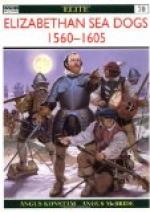The general idea was to send the Invincible Armada up the English Channel as far as the Netherlands, where Parma would be ready with a magnificent Spanish army waiting aboard troopships for safe conduct into England. The Spanish regulars could then hold London up to ransom or burn it to the ground. So far, so good. But Philip, to whom amphibious warfare remained an unsolved mystery, thought that the Armada and the Spanish army could conquer England without actually destroying the English fleet. He could not see where raids must end and conquest must begin. Most Spaniards agreed with him. Parma and Santa Cruz did not. Parma, as a very able general, wanted to know how his oversea communications could be made quite safe. Santa Cruz, as a very able admiral, knew that no such sea road could possibly be safe while the ubiquitous English navy was undefeated and at large. Some time or other a naval battle must be won, or Parma’s troops, cut off from their base of supplies and surrounded like an island by an angry sea of enemies, must surely perish. Win first at sea and then on land, said the expert warriors, Santa Cruz and Parma. Get into hated England with the least possible fighting, risk, or loss, said the mere politician, Philip, and then crush Drake if he annoys you.
Early and late persistent Philip slaved away upon this ’Enterprize of England.’ With incredible toil he spun his web anew. The ships were collected into squadrons; the squadrons at last began to wear the semblance of a fleet. But semblance only. There were far too many soldiers and not nearly enough sailors. Instead of sending the fighting fleet to try to clear the way for the troopships coming later on, Philip mixed army and navy together. The men-of-war were not bad of their kind; but the kind was bad. They were floating castles, high out of the water, crammed with soldiers, some other landsmen, and stores, and with only light ordnance, badly distributed so as to fire at rigging and superstructures only, not at the hulls as the English did. Yet this was not the worst. The worst was that the fighting fleet was cumbered with troopships which might have been useful in boarding, but which were perfectly useless in fighting of any other kind—and the English men-of-war were much too handy to be laid aboard by the lubberly Spanish troopships. Santa Cruz worked himself to death. In one of his last dispatches he begged for more and better guns. All Philip could do was to authorize the purchase of whatever guns the foreign merchantmen in Lisbon harbor could be induced to sell. Sixty second-rate pieces were obtained in this way.




